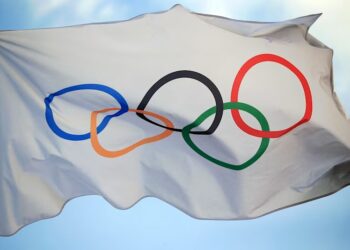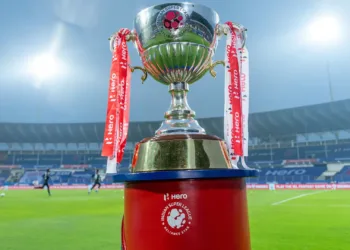Thibaut Courtois will spend the upcoming international break recovering at Real Madrid’s Valdebebas training complex after suffering an adductor longus muscle injury in his right leg. The 33-year-old Belgian goalkeeper underwent medical tests on Monday, November 10, 2025, following discomfort experienced during Real Madrid’s goalless draw against Rayo Vallecano, with the club confirming the diagnosis and ruling him out of Belgium’s crucial World Cup qualifiers against Kazakhstan and Liechtenstein. Medical reports suggest Courtois will be sidelined for approximately 10-14 days, potentially making him available for Real Madrid’s return to action against Elche on November 23 after the international break.
Table of Contents
Understanding Thibaut Courtois’ Adductor Longus Injury
The adductor longus muscle forms part of the adductor group located in the inner thigh, playing a crucial role in leg stability, hip adduction, and the explosive movements required for goalkeeping. For a goalkeeper of Thibaut Courtois’ stature, standing 199cm tall and weighing 96kg, the adductors work constantly during matches to provide balance during saves, generate power for diving, and stabilize the body during aerial challenges. Injuries to this muscle typically occur through sudden directional changes, overstretching, or accumulated fatigue from repetitive movements.
Injury Timeline and Recovery Schedule
| Date | Event | Status |
|---|---|---|
| November 8, 2025 | Discomfort vs Rayo Vallecano | Completed match |
| November 10, 2025 | Medical tests | Injury confirmed |
| November 11-24, 2025 | Recovery period | Out 10-14 days |
| November 15 | Belgium vs Kazakhstan | Unavailable |
| November 18 | Belgium vs Liechtenstein | Unavailable |
| November 23 | Real Madrid vs Elche | Potential return |
In their official statement, Real Madrid confirmed: “Following tests carried out today on our player Thibaut Courtois by the Real Madrid Medical Services, he has been diagnosed with an injury to the adductor longus muscle in his right leg. His recovery will be monitored.” The club’s characteristically cautious approach means they did not specify an exact return date, preferring to assess Courtois’ progress daily before making definitive commitments about his availability.

Spanish journalist Melchor Ruiz of COPE reported that the expectation is a two-week absence, aligning with typical recovery timelines for grade one or two adductor strains. This timeline positions Thibaut Courtois for potential involvement when Real Madrid face Elche on November 23, though the medical staff may opt for additional caution, particularly given his injury history over the past two years.
The Circumstances Surrounding the Injury
Thibaut Courtois’ injury materialized during Real Madrid’s frustrating 0-0 draw at Rayo Vallecano on Sunday, November 8. The Belgian goalkeeper completed the full 90 minutes despite experiencing discomfort, a testament to his commitment and professionalism. However, post-match assessments revealed the extent of the muscle damage, prompting Monday’s comprehensive medical examination that confirmed the adductor injury.
The timing proves particularly unfortunate as it comes during a period when Real Madrid have struggled with multiple injury setbacks. Just minutes before the club announced Courtois’ diagnosis, they had confirmed that midfielder Fede Valverde suffered a semimembranosus muscle injury in his right leg during the same match. The simultaneous announcement of two key players’ injuries underscores the physical toll the congested fixture schedule has imposed on Real Madrid’s squad.
For Thibaut Courtois personally, this injury represents another frustrating interruption to what has already been a challenging two-year period. After suffering a torn anterior cruciate ligament in August 2023 that sidelined him for most of the 2023-24 season, he worked diligently to return to peak condition. While he successfully returned and even helped Real Madrid win the UEFA Champions League in June 2024, this new muscle problem serves as a reminder of the fragility that comes with elite-level goalkeeping.
Impact on Belgium’s World Cup Qualification Campaign
For Belgium national team coach Rudi Garcia, Thibaut Courtois’ absence represents a significant setback ahead of two critical World Cup qualifiers. The Red Devils currently top Group J ahead of North Macedonia and Wales, positioning themselves favorably for direct qualification to the 2026 World Cup in the United States, Canada, and Mexico. However, they must navigate these upcoming fixtures without their first-choice goalkeeper and captain.
Belgium’s World Cup Qualifying Situation
| Team | Group J Position | Next Fixtures |
|---|---|---|
| Belgium | 1st place | vs Kazakhstan (Nov 15), vs Liechtenstein (Nov 18) |
| North Macedonia | 2nd place | Competing for qualification |
| Wales | 3rd place | Mathematical possibility remains |
Belgium faces Kazakhstan in Astana on Saturday, November 15, before hosting Liechtenstein in Liège on November 18. Victory against Kazakhstan would secure direct qualification for the World Cup, making this fixture particularly important. Thibaut Courtois’ absence means Garcia must rely on alternative goalkeeping options, with the replacement yet to be officially confirmed by the Belgian federation.
The situation becomes more complicated when considering Belgium’s other injury concerns. Manchester City midfielder Kevin De Bruyne is already ruled out for several months with a severe thigh muscle lesion, depriving Belgium of their primary creative force. Losing both Courtois and De Bruyne simultaneously represents a major blow to Belgium’s quality, though the favorable group position should still allow them to secure qualification even without their star players.
The Rocky Road Back to Belgium Duty
Thibaut Courtois’ absence from Belgium’s squad carries additional significance given his tumultuous recent history with the national team. The goalkeeper endured a 21-month exile from international duty following a bitter falling out with former Belgium coach Domenico Tedesco. The conflict, dubbed “Courtoisgate” by Belgian media, began in June 2023 when Courtois abruptly left the squad ahead of a European Championship qualifier.
The dispute centered on a captaincy disagreement. When Courtois was not named Belgium’s captain during a Euro 2024 qualifier against Austria, tensions escalated dramatically. The relationship between player and manager deteriorated beyond repair, with both sides exchanging public criticisms. Even after recovering from his ACL injury and helping Real Madrid win the Champions League, Courtois was not selected for Euro 2024, with Tedesco confirming in April 2024 that the goalkeeper would not be part of the tournament squad.
The appointment of Rudi Garcia as Belgium’s new manager in January 2025, following Tedesco’s dismissal, paved the way for Thibaut Courtois’ international return. He rejoined the national setup in March 2025, marking the end of his exile and signaling a fresh start for both player and team. His 107 international appearances rank him eighth-highest in Belgium’s all-time appearances list, and his experience and quality make him irreplaceable when fully fit.
This injury, therefore, interrupts what had been a successful reconciliation between Courtois and Belgian football. After working hard to repair relationships and regain his position as first-choice goalkeeper, missing these World Cup qualifiers through injury rather than selection represents a disappointing turn of events, though one beyond anyone’s control.
Real Madrid’s Goalkeeping Situation
For Real Madrid manager Xabi Alonso, Thibaut Courtois’ injury creates tactical adjustments but not necessarily crisis. Ukrainian goalkeeper Andriy Lunin has proven himself a capable deputy whenever called upon, demonstrating quality that would make him first choice at many elite clubs. However, the drop in quality from Courtois to Lunin remains noticeable, particularly regarding commanding the penalty area, organizing the defense, and making crucial saves in high-pressure moments.
The timing of the injury does provide some consolation. The international break means Real Madrid have no competitive fixtures until November 23, allowing Courtois to recover without missing club matches. This two-week gap provides optimal conditions for rehabilitation, with the medical staff able to work with him daily at Valdebebas while many teammates are away on international duty.
Thibaut Courtois’ Real Madrid Trophy Collection
| Competition | Titles Won | Years |
|---|---|---|
| UEFA Champions League | 2 | 2021-22, 2023-24 |
| La Liga | 4 | 2019-20, 2021-22, 2023-24, plus one with Atlético |
| FIFA Club World Cup | 3 | 2018 UAE, 2022 Morocco, 2024 |
| UEFA Super Cup | 3 | 2022-23, 2024-25, plus one with Atlético |
| Copa del Rey | 2 | One with Real Madrid, one with Atlético |
| Spanish Super Cup | 3 | 2019-20, 2021-22, 2023-24 |
Real Madrid’s immediate fixture after the international break sees them travel to face Elche on November 23, a match where Courtois might return if recovery progresses smoothly. Following that, the schedule intensifies with an away Champions League fixture against Olympiacos on November 26, then domestic clashes with Girona and Athletic Club. Having Thibaut Courtois available for this demanding period would significantly benefit Real Madrid’s prospects across multiple competitions.
The medical staff’s challenge involves balancing the desire for Courtois’ quick return against the need to prevent re-injury. Muscle injuries require complete healing before players return to competition, as premature comebacks often result in more serious problems. The conservative approach typical of Real Madrid’s medical team suggests they will not rush Courtois back, even if he feels ready before the recommended timeline expires.
The Importance of Thibaut Courtois to Real Madrid
To understand the significance of losing Thibaut Courtois, even temporarily, requires examining his importance to Real Madrid’s success. Since joining from Chelsea in 2018 for a reported £35 million, making him La Liga’s most expensive goalkeeper at the time, Courtois has established himself as one of world football’s elite shot-stoppers. His trophy collection at Real Madrid includes two Champions League titles, four La Liga championships, and numerous other honors.

The 2021-22 Champions League campaign exemplified his value. Thibaut Courtois produced a series of world-class performances throughout the knockout stages, including stunning displays against Paris Saint-Germain, Chelsea, and Manchester City. In the final against Liverpool, he made nine saves, earning Player of the Match honors as Real Madrid won 1-0. That performance showcased why he’s considered one of the greatest goalkeepers of his generation.
His statistical profile this season demonstrates continued excellence. Through 12 La Liga appearances, Courtois has conceded just 10 goals while making 31 saves, maintaining a 74.2% save percentage and a goals-against average of 0.83 per 90 minutes. In the Champions League, his numbers prove even more impressive: just 2 goals conceded in 4 matches, with a remarkable 90.9% save percentage and 0.50 goals-against average.
These statistics reflect more than shot-stopping ability. Thibaut Courtois’ command of his penalty area, distribution quality, and defensive organization elevate Real Madrid’s entire backline. His height advantage (199cm) allows him to dominate aerial situations, while his reflexes and positioning make him exceptional at stopping one-on-one chances. Defenders play with greater confidence knowing Courtois provides reliable last-line protection.
Career Achievements and Recognition
Thibaut Courtois’ career achievements extend well beyond club success to include remarkable international recognition. At the 2018 FIFA World Cup, he won the Golden Glove award as the tournament’s best goalkeeper, helping Belgium achieve their highest-ever World Cup finish of third place. His performances throughout that tournament demonstrated his ability to excel on football’s biggest stage, cementing his reputation among the world’s elite.
Individual accolades accumulated throughout his career testify to sustained excellence. He won the Ricardo Zamora Trophy three times (awarded to La Liga’s goalkeeper with the best goals-to-games ratio), a record for non-Spanish goalkeepers. His 2018 FIFA Best Goalkeeper award and Yashin Trophy further confirm peer and expert recognition of his abilities. He has been selected for the FIFA/FIFPro World XI twice, acknowledgment of being among the best at his position globally.
His club career before Real Madrid also showcased exceptional quality. At Atlético Madrid (2011-2014), Courtois won La Liga, Copa del Rey, Europa League, and reached the Champions League final, establishing himself as one of Europe’s premier young goalkeepers. His subsequent four years at Chelsea brought two Premier League titles, FA Cup, and League Cup, along with the Premier League Golden Glove award.
Statistical records highlight his consistency across different leagues and competitions. He kept the most clean sheets (34) in a single Premier League season during 2013-14. For Atlético Madrid in 2012-13, he set a La Liga record by going 1,154 minutes without conceding, the longest unbeaten run in a single season in the competition’s history. These achievements demonstrate sustained excellence across different clubs, leagues, and tactical systems.
Lunin’s Opportunity to Impress
While Thibaut Courtois’ absence creates obvious challenges, it also provides opportunities for backup goalkeeper Andriy Lunin. The Ukrainian has shown quality whenever given chances this season, suggesting Real Madrid possess adequate depth to manage this temporary absence. Lunin’s opportunity to feature during the international break’s aftermath could boost his confidence and development.
However, the reality remains that when Courtois returns to full fitness, he reclaims the starting position without question. This creates a difficult situation for Lunin, who possesses the talent to be first choice elsewhere but accepts a backup role at Real Madrid. The Ukrainian’s professionalism and quality ensure that when Courtois requires rest or faces injury, Real Madrid maintain goalkeeping standards that many clubs would envy as their first choice.
The club’s goalkeeper rotation policy under Xabi Alonso essentially doesn’t exist when Courtois is fit. Unlike outfield positions where rotation provides rest and manages workload, goalkeeping typically involves selecting the best available player for every match. This means Lunin’s playing time remains limited to cup competitions, less important league fixtures, or injury-enforced absences like the current situation.
Recovery Protocol and Return Timeline
The recovery process for adductor muscle injuries follows established protocols designed to ensure complete healing before return to competition. Initial treatment involves rest, ice, compression, and elevation to reduce inflammation and pain. Once acute symptoms subside, rehabilitation progresses through graduated exercises focusing on flexibility, strength, and functional movements.
Physical therapists guide Thibaut Courtois through range-of-motion exercises, progressing to resistance training that rebuilds muscle strength. Goalkeeper-specific drills follow, reintroducing the explosive movements, directional changes, and diving actions required during matches. Only when Courtois demonstrates full range of motion without pain, passes strength tests comparing both legs, and completes training sessions without discomfort will Real Madrid’s medical staff clear him for competitive action.
The international break provides ideal recovery conditions. With many teammates away on international duty, Courtois can focus exclusively on rehabilitation without the distraction of missing club matches. The medical staff can dedicate more attention to his individual needs, monitoring progress closely and adjusting the recovery protocol based on his body’s response to treatment.
If recovery progresses according to the projected 10-14 day timeline, Thibaut Courtois should be available for selection when Real Madrid visit Elche on November 23. However, the medical staff may adopt extra caution, potentially bringing him back gradually through training before risking competitive action. The subsequent Champions League fixture against Olympiacos on November 26 might represent a more realistic target if staff decide to provide additional recovery time.
Temporary Setback in Ongoing Recovery Journey
Thibaut Courtois’ adductor longus muscle injury represents a frustrating interruption to what has been a successful return from his long-term ACL injury. The two-week absence, while disappointing for both Real Madrid and Belgium, appears manageable given the timing coincides with the international break. His unavailability for Belgium’s World Cup qualifiers creates challenges for Rudi Garcia’s team, though their strong group position should still facilitate qualification.
For Real Madrid, losing their world-class goalkeeper temporarily tests squad depth but doesn’t create crisis. Andriy Lunin provides capable cover, and the upcoming fixture list includes matches where Real Madrid should prevail even without Courtois. The key priority remains ensuring complete recovery before his return, avoiding the temptation to rush back and risk more serious injury.

At 33 years old, Thibaut Courtois remains at the peak of his powers, as demonstrated by his excellent statistics this season. His experience, quality, and importance to both club and country make proper injury management crucial. By taking the conservative approach and allowing sufficient recovery time, Real Madrid protect their long-term investment in one of football’s elite goalkeepers, ensuring he returns fully fit and ready to continue performing at the highest level.
Read More: Fede Valverde Sidelined: Real Madrid’s Midfield Engine Faces 10-Day Recovery from Muscle Injury
FAQs
What injury did Thibaut Courtois suffer?
Thibaut Courtois suffered an adductor longus muscle injury in his right leg during Real Madrid’s match against Rayo Vallecano on November 8, 2025. The injury was confirmed following medical tests on November 10.
How long will Thibaut Courtois be out injured?
Thibaut Courtois is expected to be sidelined for 10-14 days. He should return after the international break, potentially available for Real Madrid’s match against Elche on November 23, 2025.
Will Thibaut Courtois play for Belgium during the international break?
No, Thibaut Courtois will miss Belgium’s World Cup qualifiers against Kazakhstan (November 15) and Liechtenstein (November 18), remaining at Real Madrid to recover from his muscle injury.
How many trophies has Thibaut Courtois won with Real Madrid?
Thibaut Courtois has won 12 major trophies with Real Madrid: 2 Champions League titles, 4 La Liga championships, 3 FIFA Club World Cups, 3 UEFA Super Cups, 1 Copa del Rey, and 3 Spanish Super Cups.
Who will replace Thibaut Courtois in Real Madrid’s lineup?
Andriy Lunin, Real Madrid’s backup goalkeeper, will replace Thibaut Courtois during his absence. Lunin has proven to be a capable deputy whenever called upon this season.








